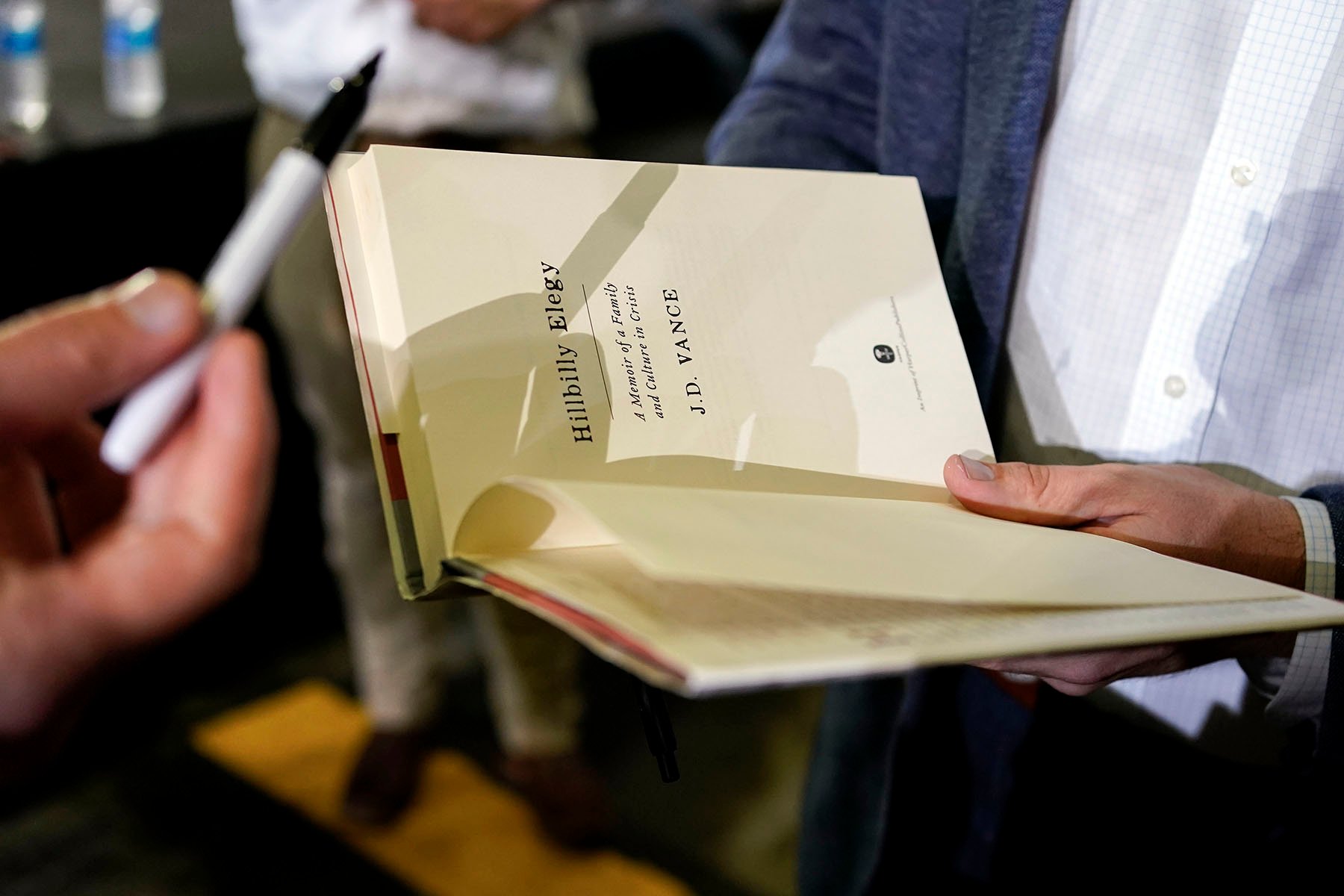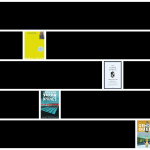Vice President JD Vance’s memoir became a political lightning rod that propelled him to office, but now “Hillbilly Elegy: A Memoir of a Family and Culture in Crisis” has been caught up in a censorship controversy sparked by the White House.
The 2016 bestseller, adapted for film by Netflix four years later, is one of over a dozen books reportedly pulled from the shelves of Department of Defense Education Activity (DoDEA) school libraries. The DoDEA runs 161 schools across the globe for children from active-duty U.S. military families and DoD civilian families.
The agency has not outright banned “Hillbilly Elegy,” but its officials have flagged the book for a compliance review, according to PEN America, a freedom of expression advocacy group. The pending review appears to be a case of “soft censorship,” which occurs when officials temporarily pull books for evaluation, require parental permission for students to read, relocate materials to certain parts of libraries or impose other restrictions short of a ban.
The claims of censorship come after President Donald Trump’s administration issued executive orders prohibiting the Armed Forces from promoting diversity, equity and inclusion (DEI), divisive concepts concerning race or sex, and “gender ideology.” For similar reasons, DoDEA schools are reportedly no longer celebrating cultural heritage months like Black History Month or allowing trans students to play on sports teams or use bathrooms that align with their gender identity. Schools have also scrubbed references to historical figures including Susan B. Anthony, the Rev. Martin Luther King Jr., Rosa Parks and Harriet Tubman from bulletin boards, multiple outlets have reported.
Jessica Tackaberry, communications director for DoDEA’s Europe region, where some of the censorship claims originated, said in a statement to The 19th that the agency is reviewing its current policies and instructional resources to comply with the White House’s recent executive orders and Department of Defense guidance.
“At this time, we are conducting a review,” she said. “No materials have been permanently removed from our school libraries pending completion of the review. During this period, materials under review will have access limited to professional staff.”
Tackaberry would not confirm which books have been pulled from shelves or disclose when the compliance review period will end. DoDEA officials have a March 3 deadline to complete the review, according to Task & Purpose, which covers military news.
On February 7, Rep. Jamie Raskin posted a memo to X addressed to teachers at a DoDEA school. The directive informed them that books “related to gender ideology or discriminatory equity ideology topics” will be removed from circulation so they can be assessed. It also advised the teachers to evaluate books in their classroom libraries for potential violations of recent executive orders.
Raskin, a Democrat from Maryland, said his constituents are outraged that military families have been subjected to censorship. “One asked a school official why they removed photos on the walls of Susan B. Anthony and Dr. King but not Leonardo DaVinci and was told: ‘He was a real historical figure,’” he shared on X.
Many of the books DoDEA schools reportedly flagged for review implicitly or explicitly promote diversity. That includes “Hillbilly Elegy,” a race-conscious book in which Vance often likens the White Appalachian population to other marginalized groups, particularly the Black and Latino communities. At times, Vance revels in the diversity around him. Describing his experience in a constitutional law seminar at Yale Law School, Vance writes:
“We called ourselves the island of misfit toys, as there was no real unifying force to our team — a conservative hillbilly from Appalachia, the super smart daughter of Indian immigrants, a black Canadian with decades’ worth of street smarts, a neuroscientist from Phoenix, an aspiring civil rights attorney born a few minutes from Yale’s campus, and an extremely progressive lesbian with the fantastic sense of humor, among others — but we became excellent friends.”
Discussing his time in the Marines, Vance recalls being pleasantly surprised by the diversity in his boot camp platoon. The members were White, Black and Hispanic; Catholic, Jewish, Protestant, atheist; rich and poor, he points out.
The Trump administration has directed DoDEA schools to give their students a patriotic education that avoids divisive concepts related to race or sex. In “Hillbilly Elegy,” Vance critiques the government by suggesting that the child welfare system lacks the cultural awareness to understand how Black, Latino and Appalachian families function. In these communities, grandparents, aunts, uncles and cousins play an influential role in children’s lives rather than the nuclear family alone, Vance posits while discussing how his troubled mother almost lost custody of him. But social service agencies ignore this, he continues. They not only require extended family members to obtain licenses to become foster parents to their young kin but are also just as likely to place vulnerable youth with strangers than they are with blood relatives.
“In other words, our country’s social services weren’t made for hillbilly families, and they often made a bad problem worse,” Vance says.
While the book makes no reference to transgender people, it discusses sexuality throughout — that of the author and of others. In fact, Vance, who convinced himself he was gay as a child, takes aim at the church for focusing more on the “gay agenda” than on Christian character. The memoir’s sympathetic portrayal of LGBTQ+ people and descriptions of substance use disorder would be enough to get the book banned in both red and blue states, if not in DoDEA schools. It is also littered with the F-word and other foul language — “Do you want to suck dicks?” his grandmother asks him when Vance frets over his sexuality.
The Office of the Vice President did not respond to The 19th’s request for comment before publication. Vance was elected to the U.S. Senate in Ohio in 2022 and sworn in as vice president in January.
It’s not as clear why the DoDEA has targeted other books, such as Oscar winner Julianne Moore’s 2007 picture book “Freckleface Strawberry.” Illustrated by LeUyen Pham, the children’s book contains no references to race, gender or sexuality, but it tacitly celebrates diversity. The protagonist, who doesn’t like how her red hair and freckles make her stand out, comes to appreciate these features. She realizes that her classmates also have unique characteristics, and she is shown playing with a diverse group of friends, including girls who appear to be Black and Asian American, though the book never calls out their race or ethnicity.
“Freckleface Strawberry is a semi-autobiographical story about a seven-year-old girl who dislikes her freckles but eventually learns to live with them when she realizes that she is different ‘just like everybody else,’” explained Moore on Instagram, adding that she graduated from a Department of Defense-run school. “It is a book I wrote for my children and for other kids to remind them that we all struggle, but are united by our humanity and our community.”
PEN America reports that DoDEA officials also pulled an Advanced Placement psychology book because it includes a chapter on “sexuality and gender” and a social studies lesson for fourth-graders called “A Nation of Immigrants.” A publication for elementary school students called “How Does Immigration Affect the US?” and a biography of a transgender man who served in the Civil War were also flagged.
“The removal of these titles is yet another indicator of the new administration’s flippant and autocratic approach to K-12 education,” Kasey Meehan, director of PEN America’s Freedom to Read program, said in a statement.
News of censorship in DoDEA schools comes just weeks after the Trump administration denied that censorship is an issue in schools, calling such claims a “hoax.” Instead, schools are simply removing materials that are obscene or grade level-inappropriate, the administration said in a January 24 press release announcing that the Department of Education’s Office for Civil Rights would not be investigating multiple claims of book banning.
PEN America says that over the past three years, book bans have nearly reached McCarthy-era levels, referring to Sen. Joe McCarthy, who led the charge against communist influences in government, the arts and other parts of society during the 1940s and ’50s. The organization has recorded almost 16,000 instances of book bans nationally since 2021.
Other books PEN America says have been pulled for review from DoDEA schools:
- “Becoming Nicole: The Transformation of an American Family” by Amy Ellis Nutt
- “No Truth Without Ruth” written by Kathleen Krull, illustrated by Nancy Zhang
- “The Kite Runner” by Khaled Hosseini
- “Brave New World” by Aldous Huxley
- “An Indigenous Peoples’ History of the United States” by Roxanne Dunbar-Ortiz
- “Well-Read Black Girl: Finding Our Stories, Discovering Ourselves” by Glory Edim
- “War: How Conflict Shaped Us” by Margaret MacMillan
- Instructional materials for sixth graders for Black History Month






